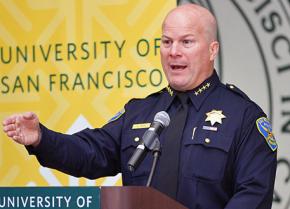How the people fired the SFPD chief
Grassroots organization and protest were central in the chain of events that led to the resignation of San Francisco's police chief, writes .
SAN FRANCISCO Police Chief Greg Suhr finally resigned May 19 after months of growing pressure for him to go.
Mayor Ed Lee had backed Suhr all along, in spite of angry controversy about recent killings by San Francisco police and a scandal about racist and homophobic texts sent by cops that made national news.
Then, on May 19, a cop fatally shot Jessica Williams, an unarmed 29-year-old Black woman, inside the car she was driving in the Bayview neighborhood. The details of this shooting and the name of the cop who perpetrated it have yet to emerge, but the murder of another unarmed Black person was the final straw.
What made Lee change his mind was not just that police reform wasn't progressing "fast enough," as he said in his statement announcing Suhr's resignation. In reality, Lee realized that dealing with yet another crisis in the aftermath of a police murder would be easier without Suhr than with him.
But the foundation for Lee's decision was laid by months of sustained popular pressure, in the form of demonstrations, marches, community organizing and a hunger strike.

Amid these protests, the preliminary findings of the district attorney's blue-ribbon panel charged with reviewing the SFPD's practices and policies suggested that the department was disproportionately using "stop and frisk" policing in Black and Latino communities--and lacking in basic accountability and transparency. The panel's findings further ratcheted up pressure on the political establishment as it has strained to head off more protests.
JESSICA WILLIAMS tragically joins a growing list of Black and Brown residents murdered by the SFPD in recent years, including Alex Nieto, Amilcar Perez-Lopez, Mario Woods and Luis Gongora.
After an SFPD officer killed Mario Woods on December 2 of last year, the Justice for Mario Woods Coalition was formed. Meeting every week since then, the coalition is bringing together a number of local organizations and individuals in the fight against police brutality. The movement has grown as it has made connections with other local groups and coalitions fighting against police brutality, such as the Justice for Alex Nieto Coalition.
One of the major strengths of the Mario Woods Coalition has been the consistency and clarity of their three demands: Charge the cops with murder, hold an independent investigation, and fire Chief Suhr.
From disrupting Mayor Lee's inauguration to marching to Super Bowl City, the demand to fire Suhr has been front and center in the movement.
Then, on April 21, a group of five members of the Mario Woods Coalition went on a hunger strike in front of the police station in the Mission neighborhood, with crowds gathering in support almost every day. The Frisco 5, as they became known, saw their health deteriorate for 17 days as the mayor ignored their demand to fire Suhr.
By May 11, after the Frisco 5 were hospitalized, four members of the Board of Supervisors echoed the calls of protesters, saying the city should begin searching for a new police chief.
It took the untimely death of another innocent Black resident at the hands of an SFPD officer to finally convince the mayor that he could no longer avoid calling for Suhr's resignation. "The People Fired SFPD Chief Suhr" was the apt headline of a blog post published on the Justice for Alex Nieto website.
Suhr's career is pocked by a long list of past misdeeds, lies and cover-ups. That someone with such a record got to keep his job as police chief for so long speaks volumes about the systemic racism and corruption of the police as an institution.
The mayor's new acting police chief is Toney Chaplin, who took the job promising to accelerate SFPD reforms. But whether these reforms will be meaningful and happen fast enough--whether they will happen at all--depends on the strength of people demanding action and raising their voices about the character of the proposed changes.
The ousting of Greg Suhr is a victory for the movement against police brutality, and it shows that collective organization and struggle can bring about change. But it needs to be the first of many.


